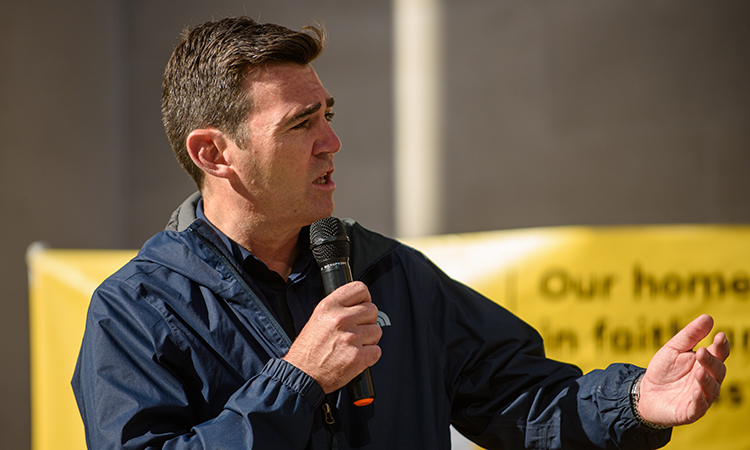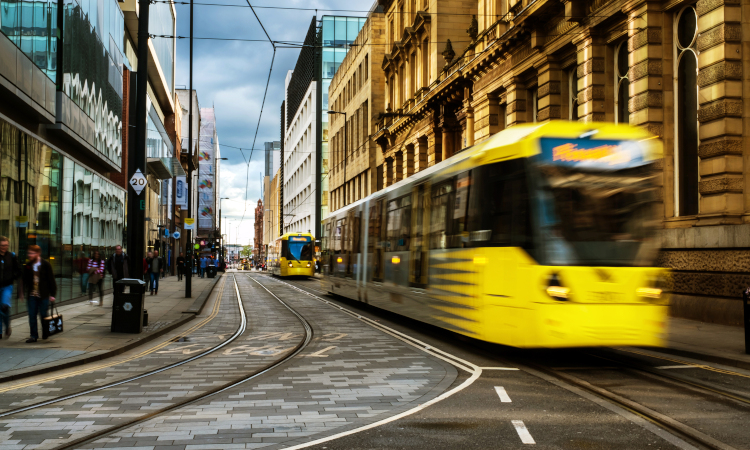“It’s my job to get what they’ve been promised”: An interview with the Mayor of Greater Manchester, Andy Burnham
- Like
- Digg
- Del
- Tumblr
- VKontakte
- Buffer
- Love This
- Odnoklassniki
- Meneame
- Blogger
- Amazon
- Yahoo Mail
- Gmail
- AOL
- Newsvine
- HackerNews
- Evernote
- MySpace
- Mail.ru
- Viadeo
- Line
- Comments
- Yummly
- SMS
- Viber
- Telegram
- Subscribe
- Skype
- Facebook Messenger
- Kakao
- LiveJournal
- Yammer
- Edgar
- Fintel
- Mix
- Instapaper
- Copy Link
Posted: 12 November 2021 | Joshua Minchin - Intelligent Transport | No comments yet
The Mayor of Greater Manchester, Andy Burnham, sat down with Intelligent Transport’s Joshua Minchin to discuss whether the region’s public transport network is fit for purpose and to outline what needs to be done to ‘level up’ the network.


Is Greater Manchester’s public transport network fit for purpose?
Andy Burnham (AB): “Parts of Greater Manchester’s public transport network are. But, considering it as a whole, my answer is no, because it doesn’t join together as a system at the moment. It’s not really a network at present, rather a collection of individual systems – a bus system, a tram system and a train network, but it isn’t a single network.
“So, on that test, I don’t think it is fit for purpose. The purpose should be ease of travel across all modes in order to make public transport the preferred option. And, because we haven’t got that from a convenience point of view or, equally, from a cost point of view, I don’t think that we can say that it is, across the whole of it, fit for purpose. Certainly parts of it are – the tram system, for instance, is something that we are very proud of – but, as a whole, no, and that’s why it requires substantial reform.”
‘Levelling up’ is a phrase that has been mentioned frequently when discussing public transport. Is the funding announced by the UK government for metro mayors enough to level up transport networks?
AB: “No, it isn’t. I’m saying that not because we’re just constantly asking for more and more and more. You cannot level up a city region like this (Greater Manchester) with just infrastructure funding, as welcome as that is. You also have to invest in services. So, it’s not us demanding more and more. The government has invited us to bid for funding to improve bus services, and that bid has now gone in.
You cannot level up a city region like this (Greater Manchester) with just infrastructure funding”
“We succeeded with the infrastructure funding, which, as I say, we were very pleased about, and we were grateful for the government’s support. If our bid for bus service improvements was to receive the same backing, then I think that it would allow a substantial act of ‘levelling up’ – that would be to create a London-style public transport system over bus and tram with, hopefully, London-level fares.
“This would be a significant step towards a more productive economy and closing the gap between the north and parts of the south. It’s kind of halfway there when it comes to public transport, at the moment.”
Why do you think that Manchester residents and residents in other cities in the north of the country have to pay more than London residents?
AB: “Well, it is because we’re 20 years behind London in the creation of a role and office of mayor that can actually do something to connect all of this together. I lived in London in the nineties, and transport in London in that period was like transport now in Greater Manchester. It was fragmented and often quite expensive. I think that what you’ve seen in London over the course of three mayors is the move towards an ever more integrated system that has become more and more cost effective to use.
The privatisation of rail and the deregulation of bus has evidently left us with the wrong type of public transport system, because it’s too expensive to use”
“I think that we are on a journey now to a system that is both integrated so that people can use it conveniently and easily, but that also costs much less than it does today. We’re on that journey, and it’s got to be about lowering fares. This has to be a primary objective, because the economics of transport in the UK aren’t currently favouring the drive to net zero. We’ve got planes costing less than trains, and it can be less to take a taxi than a bus. The economics of this are entirely in the wrong place. The privatisation of rail and the deregulation of bus has evidently left us with the wrong type of public transport system, because it’s too expensive to use.”
Why do cities outside of London have confusing ticket fare structures, and what needs to be done to improve that?
AB: “There are two reasons for that. Firstly, the deregulation of buses wiped away the structure, didn’t it? You’ve just got a multiplicity of ticket types that all of the operators run. It’s the product of a system that has no firm framework and rules running it. You end up with a confusing sort of free-for-all. It’s confusing internally within the buses, which in turn makes it impossible to integrate with the structure of tram fares because it’s so messy – it’s impossible to make sense of it all.
I’ve taken the decision to put buses back under public control, and it’s that control that allows the integration of the fare box and a system that is much simpler and more understandable to the public”
“When the office of mayor was created in London, it was created with the power that ran across all of the modes of transport across London, allowing it to be integrated into a single system with a single pricing structure – under the Oyster card at first, and now contactless.
“That was the game changing move, wasn’t it, for transport in London? And it’s only when you control the other elements of public transport that you can do something similar. So, I’ve taken the decision to put buses back under public control, and it’s that control that allows the integration of the fare box and a system that is much simpler and more understandable to the public.
“Everyone has bids for the bus service improvement plan funding at the moment, but one message I would be keen to get across is that I believe that we are in a unique position to demonstrate more returns for that money, because of the unique decision that we’ve taken to put buses under public control.
“When you have control, you control what buses are running on the road, what route they’re doing, what they’re charging. Therefore, we are better able to guarantee change in a way that other places that are trying to improve a largely commercial system are not, as they will find that more difficult than us because we’ve got direct control over the system. That is a very big part of our argument. We believe that we can remove a million tonnes of carbon from the Greater Manchester economy over the coming years, and transport will make a very large contribution to that.”


Should London always be the model for other cities in the UK? Or can Greater Manchester do things differently?
AB: “I use London as the model for two reasons, and I actually don’t make any apology continuing to point to it, because levelling up implicitly means levelling up to the most successful parts of the country, doesn’t it? Levelling up those with lower GDP with the areas with the highest. So, for me, that’s what is implicit in that policy drive.
“But, secondly, and this is a real positive about London, the London system works. People say to me, “Well, why don’t you choose a different city… one of the Scandinavian cities?” Well, the truth of the matter is, what we are doing with the bus regulatory powers that we have is very similar to the London system, and it’s helpful for me to be able to say, “We’re going to replicate something that works.” And it does work. And it’s a great credit to Transport for London (TfL) and others who’ve built it.
“Being clear about that is crucial, otherwise, when will you know whether you’ve done enough? London-level fares – that’s a really simple test of levelling up that the public will understand. If we don’t accept that simple test, it kind of lets everyone off the hook, because then you might say: “Well, you improved transport a little bit, but it’s not as far as it should be.” I don’t think that you earn the right to call it ‘levelled up’ until you can see equivalence in the quality and cost of the transport system between different parts of the country – that is levelled up.
“The reason why I keep setting that London-level fares test is because there’s no point in just improving things a little and saying, “Well, there you are. You’ve had your levelling up,” because it wouldn’t feel like that to the public. So, I will keep making that comparison. I know that it annoys some people, but the bottom line is it’s what I think that people here have been promised, and it’s my job to get what they’ve been promised.”
How do we convince people to return to public transport?
A basic level of connectivity for all communities is crucial”
AB: “I think that the fares issue is critical. I think frequency would help. The bus that I got this morning runs on a 10-minute frequency, and that’s common for buses in London. But, that wouldn’t be the case the more that you get out of the city of Manchester. The further you get into our districts, you’d be talking of two or three per hour, and that is a disincentive, I think, to using buses. So, the frequency with which we can provide services is important. A basic level of connectivity for all communities is crucial too, because we do have some cutoff communities that have lost bus services.
“Too many people have got used to using their cars because they have to. They have no choice in parts of Greater Manchester. There’s not a viable public transport alternative. Consequently, we’re going to have to work hard to encourage them to think differently. And I think it is all about a flat fare for buses linked to a daily cap across all modes. If we build that, they will come. If we just build an integrated system that’s operating at the same price levels, then I’m not so sure. We are not seeing the return of passenger numbers to pre-pandemic levels yet. We’re not predicting that to happen for a couple of years, so we’re going to be running behind where we were.
“Secondly, I would say it requires the government continuing to support transport bodies with the costs of that. The danger is it becomes a bit self-defeating if you don’t, because the passenger numbers aren’t there. If the funding doesn’t make up for that, if frequency of services has to be dropped, or the timetable cut back, then it’s easy to drift into a downward spiral. Then fewer and fewer people will use public transport, and you’ll be in very much a car led recovery, which is certainly what we want to avoid.”


Responsible for shaping the future of Greater Manchester, Burnham’s priorities include building a London-style integrated transport system, ending rough sleeping, transforming Greater Manchester into one of the greenest city regions in Europe and making Greater Manchester a great place to grow up, get on and grow old.
Before being elected as Mayor of Greater Manchester, Burnham was MP for Leigh from 2001. In government, he has held Ministerial positions at the Home Office, Department of Health and the Treasury. In 2008, he became Secretary of State for Culture, Media and Sport, before returning to Health as Secretary of State in 2009. In opposition, Burnham has served as Shadow Education Secretary, Shadow Health Secretary and Shadow Home Secretary.
Burnham lives in Leigh, Greater Manchester, with his wife and three children.
Related topics
Air Quality, Alternative Power, Multimodality, Passenger Accessibility, Passenger Experience, Public Transport, Sustainable Urban Transport, Ticketing & Payments, Transport Governance & Policy
Related modes
Bus & Coach, Tram
Related cities
Greater Manchester, United Kingdom
Related countries
United Kingdom
Related organisations
Transport for Greater Manchester (TfGM), Transport for London (TfL)
Related people
Andy Burnham








